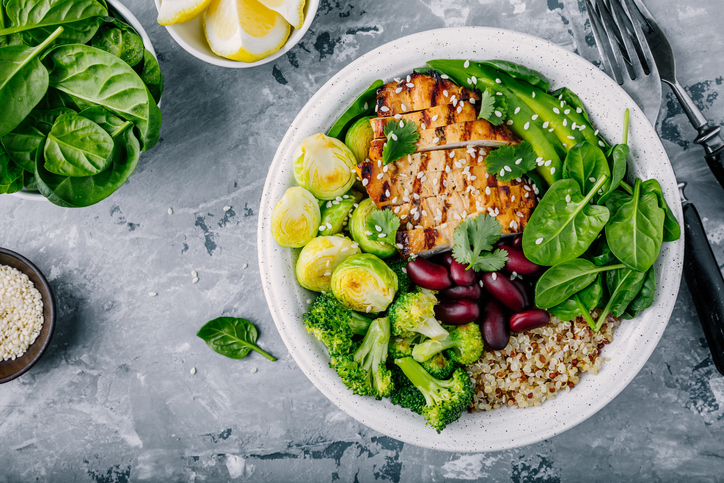Love Your Gut dietitian Jo Travers shares her advice on how to keep your gut happy and healthy when following a gluten-free diet.

Avoiding gluten means avoiding gluten-containing grains, but does not have to mean avoiding gut-healthy foods altogether. Many foods that are friendly to your gut are still on the menu for gluten-intolerant or allergic people.
When we talk about gut-friendly foods there’s a couple of different things we are looking for: things that help food move through the gut easily, and things that nurture the helpful bacteria living there. This means fibre! The cell walls of plant foods (such as wholegrains, vegetables and fruits) can’t be digested in our small intestine where digestion usually occurs. Fibre gives bulk to the stool and some fibres form a gel with water helping the bolus of food pass through the intestine easily, helping to prevent constipation. Prebiotics, which are specific types of fibre, are digested by the helpful bacteria that live in our large intestine. In return for this meal, the bacteria perform a whole range of functions for their host such as training the immune system, managing inflammation and have even been shown to affect gene expression.
While grains such as wheat and barley contain good quantities of these prebiotic if eaten in their wholegrain form, they are by no means the only source. There are plenty of naturally gluten-free foods that contain them too. Fruits and vegetables; nuts and seeds; beans, peas and lentils; grains like rice, corn, gluten-free (GF) oats and buckwheat (which isn’t actually wheat) all have different types of prebiotics, especially for the latter in their wholegrain form. Eating fruit and veg with the skin on will increase the fibre content too.
If you aren’t used to eating a diet high in fibre, it’s best to add it gradually, building up over a couple of weeks. It’s also really important to increase your fluid intake as you do as fibre absorbs water and if there isn’t enough of it, the food can get stuck, and constipation is the opposite of what we want!
Because gluten-containing grains are off limits on a GF diet, it can be more challenging – although no means impossible – to get enough prebiotics. Other things that can help boost your gut microbiome include getting plenty of sleep and exercise. Fermented foods like live yogurt, kefir and kombucha contain live bacterial cultures and can help populate and maintain some strains of gut bacteria. If you are experiencing symptoms like diarrhoea, bloating or wind, it may be because of an imbalance of bacteria. Taking a good quality probiotic has been shown to help balance out your microbiome and improve these symptoms.
Top tips for good gut health
As Jo says; “The gut has now been found to do a lot more than just digest the food we eat. We now know that there is a direct connection between the gut and our brain and with a little looking after it will definitely look after you.”
Eat a varied diet
Your gut is home to a range of helpful bacteria that help train our immune system, digest food and even affect our genes. To keep them thriving, you need to feed them well.[1] Fibre-based foods are perfect for this so eat plenty of plant foods like vegetables, beans and whole grains.

Keep hydrated
For food to move through the digestive system and bowels it needs to be properly lubricated and this simply means drinking enough water. Aim for around 2 litres of fluid every day.[2]
Eat fermented foods
Traditional fermentation of foods like yogurt and kimchi, grows lactic acid bacteria which colonise the gut when eaten and may have a positive effect on metabolism.[3] Introducing bacteria to your gut through fermented foods can also support the bacteria that are already living there.[4]
Get into nature
Just coming into contact with the outdoors is enough to influence your gut bacteria. Microscopic airborne particles are colonised by a variety of bacteria that make their way into us via the air we breathe.5 Getting into different environments – like taking a trip to the countryside – will also increase the diversity of environmental bacteria we are exposed to and may also improve our microbiota.6

Get enough sleep
We all know that good night’s sleep can make us feel better, but it has also been shown to have a direct effect on our microbiota. Even two nights of disrupted sleep has been shown to disrupt the ratio of two strains of bacteria thought to be involved in obesity.7
Keep moving
Getting enough exercise can increase populations of some bacteria that can reduce inflammation.8 It also aids peristalsis – the movement of food through the gut – and may help to improve symptoms of constipation.9
For more information visit www.loveyourgut.com
References
1 David et al. (2014) Diet rapidly and reproducibly alters the human gut microbiome. Nature 505:559–563
2 EFSA Panel on Dietetic Products, Nutrition, and Allergies (NDA) (2010), Scientific opinion on dietary reference values for water. EFSA Journal, 8: Issue 3, 1459
3 Kim et al. (2011) Fermented kimchi reduces body weight and improves metabolic parameters in overweight and obese patients. Nutr Res. 31(6):436-43.
4 Burmeister A (2015) Horizontal Gene Transfer. Evol Med Public Health.2015(1): 193–194.
5 Mhuireach et al. (2016) Urban greenness influences airborne bacterial community composition. Science of The Total Environment 571; 680-687
6 Parajuli A et al. (2018) Urbanization reduces transfer of diverse environmental microbiota indoors. Front Microbiol 9:84
7 Benedict et al. (2016) Gut Microbiota and Glucometabolic Alterations in Response to Recurrent Partial Sleep Deprivation in Normal-weight Young Individuals Mol Metab 5(12):1175-1186
8 Monda et al. (2017) Exercise Modifies the Gut Microbiota with Positive Health Effects. Oxidative Medicine and Cellular Longevity. 2017:3831972.
9 De Schryver AM et al. (2005) Effects of regular physical activity on defecation pattern in middle-aged patients complaining of chronic constipation. Scand J Gastroenterol. 40(4):422-9.

